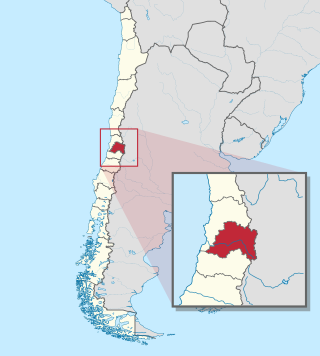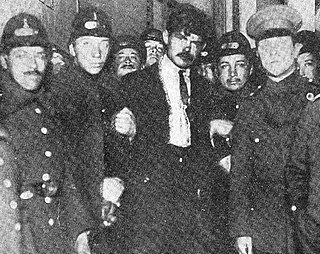
Terrorism in India, according to the Home Ministry, poses a significant threat to the people of India. Compared to other countries, India faces a wide range of terror groups. Terrorism found in India includes Islamist terrorism, ultranationalist terrorism, and left-wing terrorism. India is one of the countries most impacted by terrorism.
In the United States, domestic terrorism is defined as terrorist acts that were carried out within the United States by U.S. citizens and/or U.S. permanent residents. As of 2021, the United States government considers white supremacists to be the top domestic terrorism threat.
Anti-terrorism legislation are laws aimed at fighting terrorism. They usually, if not always, follow specific bombings or assassinations. Anti-terrorism legislation usually includes specific amendments allowing the state to bypass its own legislation when fighting terrorism-related crimes, under alleged grounds of necessity.
Terrorism in Russia has a long history starting from the time of the Russian Empire. Terrorism, in the modern sense, means violence against civilians to achieve political or ideological objectives by creating extreme fear.

The Occupation of Araucanía or Pacification of Araucanía (1861–1883) was a series of military campaigns, agreements and penetrations by the Chilean army and settlers into Mapuche territory which led to the incorporation of Araucanía into Chilean national territory. Pacification of Araucanía was the expression used by the Chilean authorities for this process. The conflict was concurrent with Argentine campaigns against the Mapuche (1878–1885) and Chile's wars with Spain (1865–1866) and with Peru and Bolivia (1879–1883).

Indigenous peoples in Chile or Native Chileans form about 13% of the total population of Chile. According to the 2017 census, almost 2,200,000 people declare having indigenous origins. Most Chileans are of partially indigenous descent; however, indigenous identification and its legal ramifications are typically reserved to those who self-identify with and are accepted within one or more indigenous groups.
The Jaipur bombings were a series of nine synchronized bomb blasts that took place on 13 May 2008 within a span of fifteen minutes at locations in Jaipur, the capital city of the Indian state of Rajasthan and a tourist destination. Official reports confirm 63 dead with 216 or more people injured. The bombings shocked most of India and resulted in widespread condemnation from leaders across the world with many countries showing solidarity with India in its fight against terrorism.

Coordinadora Arauco-Malleco (CAM) is a radical, militant indigenous organization engaged in political violence in pursuit of attaining an autonomous Mapuche state in the territory they describe as Wallmapu.
The Mapuche conflict involves indigenous Mapuche communities, also known as the Araucanians, located in Araucanía and nearby regions of Chile and Argentina. It is often referred to as a conflict between the Mapuche and the Chilean government or state, despite the fact that there have been a variety of other actors participating in the conflict such as the Spanish Empire as well as corporations such as big forestry companies and their contractors. In the past decade of the conflict, Chilean police and some non-indigenous landowners have been confronted by militant Mapuche organizations and local Mapuche communities in the context of the conflict. Some scholars argue the conflict is an indigenous self-determination conflict; others like Francisco Huenchumilla see it as the expression of a wider political conflict that affects all of Chile given the existence of other indigenous groups.
As an archaeological culture, the Mapuche people of southern Chile and Argentina have a long history which dates back to 600–500 BC. The Mapuche society underwent great transformations after Spanish contact in the mid–16th century. These changes included the adoption of Old World crops and animals and the onset of a rich Spanish–Mapuche trade in La Frontera and Valdivia. Despite these contacts Mapuche were never completely subjugated by the Spanish Empire. Between the 18th and 19th century Mapuche culture and people spread eastwards into the Pampas and the Patagonian plains. This vast new territory allowed Mapuche groups to control a substantial part of the salt and cattle trade in the Southern Cone.
A series of bomb attacks, which continued as of 2014 with about 200 bombs up to that date, started in the capital of Chile, Santiago, in 2005.

On 8 September 2014, a fire extinguisher bomb exploded in the Escuela Militar metro station in Santiago, Chile, injuring 14 people, several seriously. Though no group or individual has claimed responsibility, the attacks have been attributed to the Chilean Anarchist group, Conspiracy of Cells of Fire.
Terrorism in Argentina has occurred since at least the 1970s, especially during the Argentine Dirty War, where a number of terror acts occurred, with support of both the democratic government of Juan Perón, Isabel Perón and the following de facto government of the National Reorganization Process. In the 1990s, two major terrorist attacks occurred in Buenos Aires, which together caused 115 deaths and left at least 555 injured.
In Araucania, southern Chile, resides a large Indigenous group, by the name of the Mapuche. This group makes up the majority of individuals living in this region. They were deprived of their territorial and political rights after Chile declared independence from Spain. This decision resulted in the government forcing the Mapuche to live on reserves that they were forbidden to having full ownership of. Due to the perceived injustices they had been experiencing, they decided to start a hunger strike in hopes of changing the current property laws.

The Efraín Plaza Olmedo Dynamite Band, also known as the Dynamite Gang, was an urban guerrilla group active in Santiago, and known for its attacks against banks and the Hotel Marriott Santiago de Chile. The group named themselves after Efraín Plaza Olmedo, a Chilean anarchist responsible for a shooting that on July 14, 1912, fired at a crowd in the heart of Santiago, killing 2 young men from the wealthy class. He justified his attack as "a way to attract the attention of the people for their misery and the egotism of the bourgeoisie." He was sentenced to 40 years in prison. He was released in 1925, but was found dead days later without knowing if it was a suicide or if he was murdered.

Individualists Tending to the Wild is a self-defined eco-extremist group that emerged in Mexico in 2011. The Mexican authorities have attributed some violent actions to it, but most of the attacks claimed by the group have been denied after judicial investigations and attributed to other groups or crimes other than terrorism. The lack of a task of contrasting information by the media has led to any violent action claimed by ITS reaching public opinion.
The Iconoclastic Caravans for Free Will were an anarchist cell active in the Santiago Metropolitan Region, being known for some attacks in the communes of Las Condes and Vitacura. The group gained attention from the authorities for its members being closely investigated during the investigation of the Bombas Case.
The Jean Marc Rouillan Armed and Soulless Columns was an urban guerrilla group created in 2008 in the Santiago Metropolitan Area, responsible for some attacks with explosives. The group gained notoriety when it was investigated by the authorities in relation to the "bomb case".
The Leon Czolgosz Autonomous and Destructive Forces, were a Chilean anarchist cell formed in September 2006, known for its attacks against the National Intelligence Agency of Chile and the British embassy in Chile. The name of the group was in honor of the American anarchist Leon Czolgosz, who on September 6, 1901 assassinated then-United States President William McKinley with two bullets at point-blank range.

Karina Riquelme Viveros is a Chilean human rights lawyer. Riquelme is affiliated with the Center for Research and Defense of the South, an organization committed to defending the rights of indigenous Chileans. Groups such as Amnesty International have stated that Riquelme has been subject to persecution and intimidation campaigns for her role defending indigenous activists.








